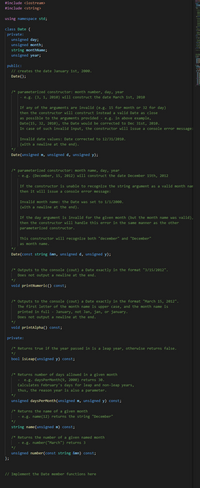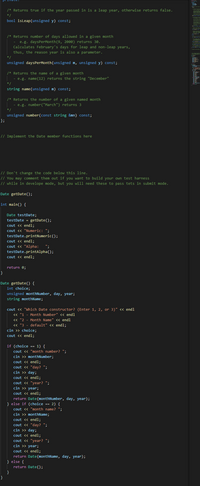
Concept explainers
Coding Language C++
Note: Do not make use of coding techniques that are too advanced such as linked lists or recursive functions
Must be done using classes
Private Member Functions
The member functions declared private, isLeap, daysPerMonth, name, number, are helperfunctions - member functions that will never be needed by a user of the class, and so do not belong to the public interface (which is why they are "private"). They are, however, needed by the interface functions (public member functions), which use them to test the validity of arguments and construct valid dates. For example, the constructor that passes in the month as a string will call the number function to assign a value to the unsigned member variable month.
isLeap: The rule for whether a year is a leap year is:
- (year % 4 == 0) implies leap year
- except (year % 100 == 0) implies NOT leap year
- except (year % 400 == 0) implies leap year
So, for instance, year 2000 is a leap year, but 1900 is NOT a leap year. Years 2004, 2008, 2012, 2016, etc. are all leap years. Years 2005, 2006, 2007, 2009, 2010, etc. are NOT leap years.
Output Specifications
Read the specifications for the print function carefully. The only cout statements within your Date member functions should be:
- the "Invalid Date" warnings in the constructors
- in your two print functions
Required Main Function
You must use the provided main function and global function getDate as they are here. You may not change these functions at all to pass the tests in submit mode.
Transcript of code:
#include <iostream>
#include <string>
using namespace std;
class Date {
private:
unsigned day;
unsigned month;
string monthName;
unsigned year;
public:
// creates the date January 1st, 2000.
Date();
/* parameterized constructor: month number, day, year
- e.g. (3, 1, 2010) will construct the date March 1st, 2010
If any of the arguments are invalid (e.g. 15 for month or 32 for day)
then the constructor will construct instead a valid Date as close
as possible to the arguments provided - e.g. in above example,
Date(15, 32, 2010), the Date would be corrected to Dec 31st, 2010.
In case of such invalid input, the constructor will issue a console error message:
Invalid date values: Date corrected to 12/31/2010.
(with a newline at the end).
*/
Date(unsigned m, unsigned d, unsigned y);
/* parameterized constructor: month name, day, year
- e.g. (December, 15, 2012) will construct the date December 15th, 2012
If the constructor is unable to recognize the string argument as a valid month name,
then it will issue a console error message:
Invalid month name: the Date was set to 1/1/2000.
(with a newline at the end).
If the day argument is invalid for the given month (but the month name was valid),
then the constructor will handle this error in the same manner as the other
parameterized constructor.
This constructor will recognize both "december" and "December"
as month name.
*/
Date(const string &mn, unsigned d, unsigned y);
/* Outputs to the console (cout) a Date exactly in the format "3/15/2012".
Does not output a newline at the end.
*/
void printNumeric() const;
/* Outputs to the console (cout) a Date exactly in the format "March 15, 2012".
The first letter of the month name is upper case, and the month name is
printed in full - January, not Jan, jan, or january.
Does not output a newline at the end.
*/
void printAlpha() const;
private:
/* Returns true if the year passed in is a leap year, otherwise returns false.
*/
bool isLeap(unsigned y) const;
/* Returns number of days allowed in a given month
- e.g. daysPerMonth(9, 2000) returns 30.
Calculates February's days for leap and non-leap years,
thus, the reason year is also a parameter.
*/
unsigned daysPerMonth(unsigned m, unsigned y) const;
/* Returns the name of a given month
- e.g. name(12) returns the string "December"
*/
string name(unsigned m) const;
/* Returns the number of a given named month
- e.g. number("March") returns 3
*/
unsigned number(const string &mn) const;
};
// Implement the Date member functions here
// Don't change the code below this line.
// You may comment them out if you want to build your own test harness
// while in develope mode, but you will need these to pass tets in submit mode.
Date getDate();
int main() {
Date testDate;
testDate = getDate();
cout << endl;
cout << "Numeric: ";
testDate.printNumeric();
cout << endl;
cout << "Alpha: ";
testDate.printAlpha();
cout << endl;
return 0;
}
Date getDate() {
int choice;
unsigned monthNumber, day, year;
string monthName;
cout << "Which Date constructor? (Enter 1, 2, or 3)" << endl
<< "1 - Month Number" << endl
<< "2 - Month Name" << endl
<< "3 - default" << endl;
cin >> choice;
cout << endl;
if (choice == 1) {
cout << "month number? ";
cin >> monthNumber;
cout << endl;
cout << "day? ";
cin >> day;
cout << endl;
cout << "year? ";
cin >> year;
cout << endl;
return Date(monthNumber, day, year);
} else if (choice == 2) {
cout << "month name? ";
cin >> monthName;
cout << endl;
cout << "day? ";
cin >> day;
cout << endl;
cout << "year? ";
cin >> year;
cout << endl;
return Date(monthName, day, year);
} else {
return Date();
}
}


Trending nowThis is a popular solution!
Step by stepSolved in 3 steps with 1 images

- C++ language (Composition problem) Given the following two classes A and B, where all member functions have been fully implemented inline. class A { public: void f(int arg) { data = arg; } int g() { return data; } private: int data; }; class B { public: A x; }; int main() { B obj; // ... write code here return 0; } a. Insert the code in the main() function that assigns integer value 99 to the “data” member of obj, which is a B class object). b.Write the code to display the value (i.e., 99) that has just been assigned to the obj. c. Note that only a single object obj of B class is declared. How many times are constructors called? If more than one constructor is called, in what order are they called?arrow_forwardn C++ all binding is static unless we do what? , we must implement a virtual function declare them as dynamic use inheritance for the objects. declare them as constarrow_forwardDefine member access specifiers.arrow_forward
 Database System ConceptsComputer ScienceISBN:9780078022159Author:Abraham Silberschatz Professor, Henry F. Korth, S. SudarshanPublisher:McGraw-Hill Education
Database System ConceptsComputer ScienceISBN:9780078022159Author:Abraham Silberschatz Professor, Henry F. Korth, S. SudarshanPublisher:McGraw-Hill Education Starting Out with Python (4th Edition)Computer ScienceISBN:9780134444321Author:Tony GaddisPublisher:PEARSON
Starting Out with Python (4th Edition)Computer ScienceISBN:9780134444321Author:Tony GaddisPublisher:PEARSON Digital Fundamentals (11th Edition)Computer ScienceISBN:9780132737968Author:Thomas L. FloydPublisher:PEARSON
Digital Fundamentals (11th Edition)Computer ScienceISBN:9780132737968Author:Thomas L. FloydPublisher:PEARSON C How to Program (8th Edition)Computer ScienceISBN:9780133976892Author:Paul J. Deitel, Harvey DeitelPublisher:PEARSON
C How to Program (8th Edition)Computer ScienceISBN:9780133976892Author:Paul J. Deitel, Harvey DeitelPublisher:PEARSON Database Systems: Design, Implementation, & Manag...Computer ScienceISBN:9781337627900Author:Carlos Coronel, Steven MorrisPublisher:Cengage Learning
Database Systems: Design, Implementation, & Manag...Computer ScienceISBN:9781337627900Author:Carlos Coronel, Steven MorrisPublisher:Cengage Learning Programmable Logic ControllersComputer ScienceISBN:9780073373843Author:Frank D. PetruzellaPublisher:McGraw-Hill Education
Programmable Logic ControllersComputer ScienceISBN:9780073373843Author:Frank D. PetruzellaPublisher:McGraw-Hill Education





